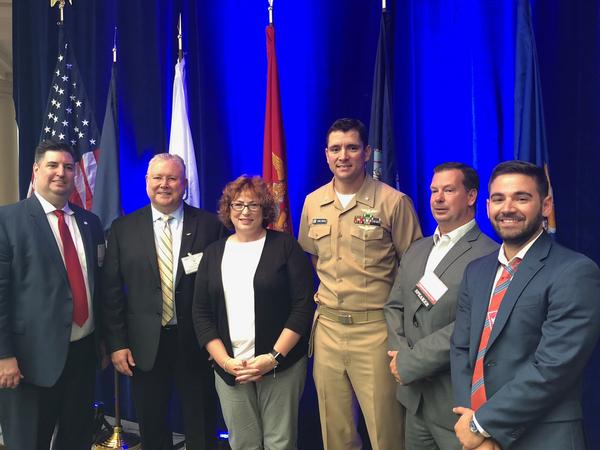 |
| NORTHERN VIRGINIA CHAPTER CHAPTER - Sep 21, 2018 |
Big Data Experts Share Insights on AI, Machine Learning |
AI/ML! AI/ML! The chant heard around the community was no different from the one at the chapter's September luncheon. The event featured a panel of speakers responsible for large programs grappling with terabytes to petabytes of data. While it was billed as a panel on big data analytics, the speakers quickly shifted gears to talk quite a bit about artificial intelligence and machine learning (AI/ML) initiatives. After brief introductions, moderator Jeffrey Schneider, U.S. Defense Department Office of People Analytics, Defense Human Resources Activity, began to navigate the group through a series of insightful discussions. Teresa Smith, chief data officer, Defense Logistics Agency (DLA), introduced the AI/ML theme when she talked about having a Christmas deadline to meet AI/ML initiatives. She jokingly talked about working hard to deliver that "present" to her leadership. Representatives across the DLA brainstormed 45 use cases for AI analytics, Smith said, but there is still a lot of work to do. Thomas Sampson, the U.S. Navy's enterprise data strategy and management lead for the F-35 Lightning II Joint Program Office, said being a data-first organization is the biggest shift for his program. He said his program relies on concrete facts to make decisions but must be able to adjust to changing conditions. Sampson noted that the new F-35 systems provide so much data that the question is often what to do with it. AI fits for tasks that require memorization, but tasks that require abstract or creative thinking will always need a human, he explained. Robert Landreth, chief cyber engineer, Defense Information Systems Agency (DISA), discussed AI as it relates to cyber. The biggest challenge analysts face today is dealing with false positives and the volume of sensor outputs, he said. Data quality has a major effect on AI. He stressed that incorrect data throws off the models. AI output needs to include not just the answer but how it came up with the recommendation to build the trust factor in the workforce. For now, DISA is just starting to work on AI, and progress won't happen overnight, but key steps are expected in the near term, he said. Overall, the panelists agreed that AI/ML will not replace all human activities and that the community needs to be educated about it. This is needed not only to reduce the fear factor but also to ensure that AI/ML is applied in the correct areas. There is no charging into the great unknown. Most of the panelists noted that a small-scale initial win would be the best route to AI/ML adoption across the workforce. |
Event Photographs: |
 Jeffrey Schneider, U.S. Defense Department Office of People Analytics, Defense Human Resources Activity (r), moderator of the chapter's September panel on artificial intelligence and machine learning, gathers with fellow panelists. |

